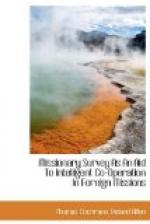(iv) Seeing that the missionary task is essentially world-wide, it is obvious that a world-wide work cannot be properly directed without a world-wide view. Now, missionary survey is in its infancy, and in most parts of the world it has yet to be begun. A full and complete missionary survey of the whole world would necessarily be a considerable undertaking, for many important facts could not be easily or quickly collected. There is then a strong tendency for men to argue that, since all the facts desirable cannot be known at once without much time and expense, it is futile and dangerous to collect those facts which can be collected speedily without great expense. A little knowledge, they say, is a dangerous thing ... let us remain ignorant.
We would venture to suggest that a little knowledge is only dangerous when it is mistaken for much knowledge; that it is far better to act on knowledge which can be obtained than to act in total ignorance, blindly. Where we must act it is our duty to know all that we can know, and if, because we cannot collect all the information that we should wish to possess, we refuse to collect that information which we can obtain, because we realise that it will be incomplete, we commit a serious moral and intellectual crime. If we can know only one factor out of one hundred, we offend if we refuse to know that one. We must act. We have no right to shut our eyes to knowledge which ought to guide our action because we are aware that action taken on that one factor will be insufficiently guided. The one factor is an important one and must influence our action, and would influence our action if we knew all the other factors. We ought to allow it to influence our action even in ignorance of the other factors.




